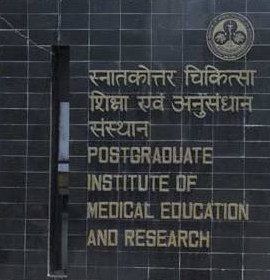The recent tragedy of a newborn girl losing her life en route to Chandigarh’s Post Graduate Institute of Medical Education and Research (PGI) has sparked nationwide outrage, forcing society to confront some uncomfortable questions about ethics, healthcare access, and the discriminatory way in which India’s premier institutions often function. While the government repeatedly emphasizes flagship campaigns such as “Beti Bachao, Beti Padhao” to save and empower the girl child, the ground reality reflects a painful contradiction. For the poor and marginalized, medical care too often remains a privilege they cannot afford, and even when they reach so-called “world-class” facilities, their lives are treated as secondary.
The Incident That Shook Public Conscience
On the night of September 6, a baby girl was born in Himachal Pradesh under complicated circumstances. When her health deteriorated, she was referred to Chandigarh’s PGI, a premier medical institute considered the final hope for critical patients from Himachal, Punjab, Haryana, and beyond. But what awaited the child’s family was not compassionate care but despair. According to reports, the father was told by hospital staff that the child would not survive and was asked to “take her away.” On the way back, when the infant’s breathing stopped, the devastated father left her body in roadside bushes.
This chilling narrative is not merely a personal tragedy—it is an indictment of the system. A premier healthcare institution, run on taxpayer money and entrusted with protecting life, failed to uphold its ethical duty. It raises the haunting question: would the response have been the same if the patient had been the child of a minister, senior bureaucrat, or influential industrialist?
Medical Ethics Versus Institutional Practices
Medical ethics is built on one fundamental principle: the duty to save life irrespective of identity, status, or financial background. From the Hippocratic Oath to modern medical codes, doctors are bound by a moral and professional responsibility to exhaust all possible efforts to preserve life. In the PGI case, however, the very spirit of this oath appears to have been compromised.
Hospitals like PGI are known for their cutting-edge infrastructure, advanced technology, and some of the best-trained professionals in the country. Yet the experience of common people often tells a very different story. Emergency wards overcrowded with patients, endless referrals, and bureaucratic hurdles too often replace timely and humane care. Instead of being the great equalizer, these institutions become symbols of inequality, where the poor are seen as burdens and the privileged as priorities.
The ethical failure lies not just in one decision but in the culture of neglect that allows such decisions to become normalized. When a father carrying a struggling newborn is turned away with hopeless words, it reflects not just one doctor’s judgment but a systemic indifference.
The Double Standards of Healthcare Access
What angers people most is the perception that premier institutions like PGI are far more responsive when it comes to high-profile patients. For politicians, bureaucrats, or their families, doors open quickly, specialists assemble within minutes, and every possible resource is mobilized. For the common man, the reality is starkly different: waiting hours in emergency rooms, struggling to get tests done, and sometimes being denied even the most basic compassion.
This double standard is dangerous not only for public trust but also for the credibility of such institutions. If world-class healthcare is available only for the elite, then the very purpose of public institutions is defeated. Taxpayers from rural Himachal or small towns of Punjab fund these hospitals as much as any influential industrialist does, yet when their children fall sick, they find themselves abandoned.
Save the Girl Child: Slogans Versus Reality
India’s “Beti Bachao, Beti Padhao” campaign has been one of the government’s flagship programs, aimed at addressing gender discrimination and promoting the survival, protection, and education of girls. Billboards, television ads, and political speeches remind citizens to value and protect daughters. But how does this campaign hold up when a newborn girl is denied urgent care in one of India’s top hospitals?
The tragedy of this infant underscores the hypocrisy that lies between policy and practice. Saving the girl child is not just about discouraging female foeticide—it is about ensuring that every girl born has equal access to health, nutrition, and opportunities. When premier hospitals turn away a newborn, it sends a devastating message that the value of a girl’s life remains conditional on privilege and power.
Accountability and the Need for Reform
The outrage over the PGI case must not fade into silence, as has often happened with similar incidents in the past. Accountability needs to be demanded at multiple levels. Was every possible medical intervention attempted? Was the family given transparent information and proper support? Why do such institutions lack a clear, monitored protocol to ensure that no emergency patient is dismissed without full treatment?
Reform is not optional—it is essential. Some possible steps include:
- Transparent Emergency Protocols: Hospitals like PGI must have strict, publicly available rules ensuring that no emergency patient can be refused care, irrespective of prognosis.
- Ethical Oversight Committees: Independent medical ethics boards should review such cases and hold institutions accountable.
- Public Audits of Healthcare Delivery: Institutions funded by taxpayers must publish regular reports on how many emergency cases they admitted, treated, or turned away.
- Training for Compassionate Care: Doctors and staff must be sensitized that their role goes beyond medicine—it is about humanity.
A Test of Our Collective Humanity
The death of this baby girl is more than a story of medical negligence—it is a mirror to our collective conscience. If India is to truly honor its daughters, then healthcare systems must be rebuilt on the foundations of equality, compassion, and accountability. Campaigns like “Save the Girl Child” must go beyond slogans and reflect in the lived experiences of families who rush their daughters to hospitals in desperation.
Medical institutions, particularly elite ones like PGI, must ask themselves: are they serving the people who need them most, or only those who wield power? The answer will define not just the future of Indian healthcare but also the moral fabric of the nation.
Until then, the haunting image of a grieving father leaving his daughter’s lifeless body in the bushes will remain a stark reminder that in today’s India, saving the girl child is still a promise unfulfilled.
SEO Keywords: PGI Chandigarh negligence, healthcare ethics in India, Save the Girl Child campaign failure, elite medical treatment India, Beti Bachao Beti Padhao reality, common man denied medical care, medical institutions accountability
Would you like me to also prepare a shorter (200-word) web version of this with punchy SEO keywords for quick online publishing alongside this long-form feature?





